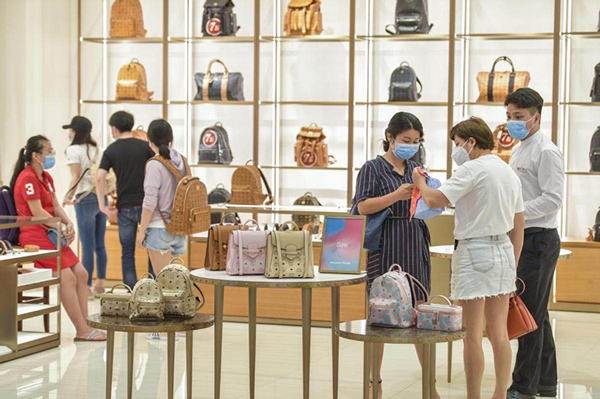
Tourists purchase luxury goods at a duty-free store in Haikou, capital of South China's Hainan province, on May 2. [Photo by Luo Yunfei/China News Service]
Inside a duty-free shop in downtown Haikou, capital of South China's island province of Hainan, Su Yanqing was selecting a wristwatch for herself.
"I had decided to buy a watch before I came here," said Su, a tourist from Xiamen, East China's Fujian province. "The price in the duty-free shop is definitely lower than in ordinary shopping malls." Besides picking a watch worth about 10,000 yuan ($1,447), she also planned to buy cosmetics and skin care products.
From July 1, Hainan has increased its annual tax-free shopping quota from 30,000 yuan to 100,000 yuan per person. The number of duty-free goods categories has also expanded from 38 to 45, with products such as mobile phones and laptops added to the list.
The previous tax-free limit of 8,000 yuan for a single item has also been scrapped, and the number of categories with a single-purchase quantity limit has been significantly reduced. For example, the duty-free single-purchase limit for cosmetics has been raised from 12 items to 30.
"I do not have to worry about the number of purchases," said Liu Yue, a local citizen who bought a dozen skin care products in the duty-free shop. "Thanks to the new policy, we can buy more expensive items now," she said, appreciating the new policy for stimulating consumption.
According to official data, Hainan's duty-free sales exceeded 5 billion yuan from July 1 to Aug 18, up 250 percent on a yearly basis.
Retail travel business has been under pressure since the COVID-19 outbreak due to the sharp fall in international travel. However, China's duty-free consumption is accelerating thanks to policy incentives.
In March, Chinese authorities unveiled new guidelines to boost consumption and unleash the potential of the domestic market, and vowed further reforms for the duty-free sector, including the building of a number of urban duty-free shops with Chinese features and expansion of duty-free business at ports.
Chen Xi, director of the Hainan provincial department of commerce, said the newly introduced duty-free goods were welcomed by consumers, with mobile phones, liquor and tablets being the best-selling products.
Total sales of single products priced above 8,000 yuan reached nearly 1.2 billion yuan from July 1 to Aug 18, surging 420 percent year-on-year. "It has played an important role in winning back consumers who used to buy high-end products overseas," Chen said.
Hainan currently has four offshore duty-free shops-two in Haikou, and one each in Qionghai and the popular resort city of Sanya, where the island province plans to build three more duty-free shops.
According to a research report by UBS in July, the new duty-free policy in Hainan could significantly drive the sales of fashion and luxury products such as bags, jewelry and watches. It estimated that the contribution of fashion and luxury products in total duty-free sales in Hainan would rise to 40 percent by 2025 from the current 15 percent.